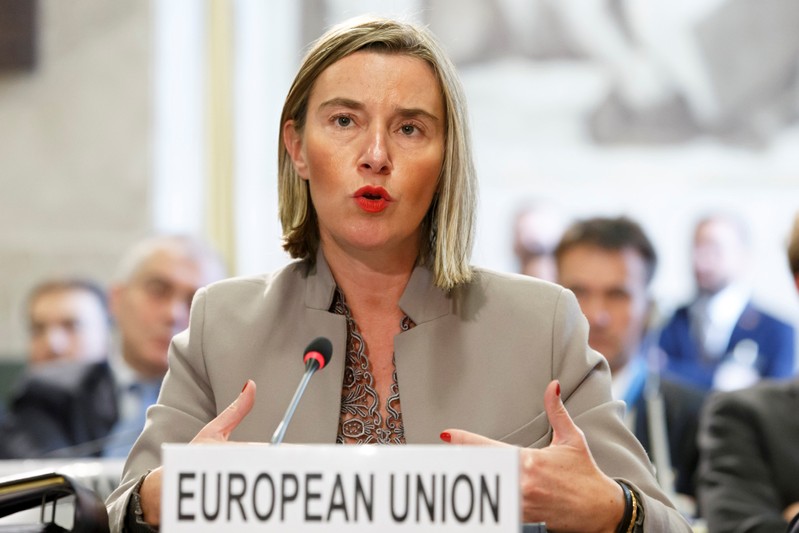
European Union Foreign Policy Chief Federica Mogherini delivers her statement, during the Geneva Conference on Afghanistan, at the European headquarters of the United Nations in Geneva, Switzerland November 28, 2018. Salvatore Di Nolfi/Pool via REUTERS
November 29, 2018
By Gabriela Baczynska
BRUSSELS (Reuters) – The European Union’s hawks have called for more sanctions on Russia after a fresh flare-up of tensions with Ukraine but the divided bloc is not going to act swiftly, if at all, diplomatic sources said.
In a sign of their long-standing divisions on how to handle President Vladimir Putin’s Russia, the 28 EU states have taken three days to agree a joint statement after Russia seized Ukrainian navy vessels and sailors on Sunday.
In the end the bloc issued a statement by its top diplomat Federica Mogherini on Wednesday night expressing “utmost concern about the dangerous increase of tensions” and dismay at the “unacceptable” use of force by Russia.
The three former Soviet republics sitting on the Baltic Sea coast, backed by Poland and Britain, wanted much tougher language on more sanctions looming.
Several senior European politicians raised the prospect on Tuesday and U.S. President Donald Trump said he might cancel a meeting with Putin later this week over the maritime clash he described as “aggression”.
But the bloc’s top powers Germany and France have so far emphasized efforts to ease tensions. The statement by Mogherini did not mention sanctions but only says regarding the situation that the bloc will “continue to follow closely” and “act appropriately.”
Countries including Italy, Greece, Bulgaria and Cyprus have long called for a softer stance vis-à-vis Moscow, saying the bloc’s existing economic sanctions over Russia’s role in the turmoil in Ukraine hurt EU businesses too.
“We are not going to move very quickly on any new sanctions, there could be some later on, that is not ruled out. But for now the unity of the 28 is key. And focus on de-escalation,” one EU diplomat said.
German Chancellor Angela Merkel spoke to Putin and Ukraine’s President Petro Poroshenko on Tuesday. Russian Foreign Minister Sergei Lavrov was in France.
“There is a lot of contacts going on. Let’s see where they take us. I doubt we will rush on sanctions too much,” another EU diplomat also said.
The bloc first imposed sanctions after Russia annexed the Black Sea peninsula of Crimea from Kiev in 2014. Brussels tightened the measures as Moscow went on to back rebels fighting against government troops in east Ukraine.
EU leaders are expected to decide to roll the economic sanctions over for another year when they meet in Brussels in December. They could also look at any new punitive measures then after a discussion among their foreign ministers on Dec.10.
“In order to discuss sanctions, we’d need to have a clearer picture of what happened,” another EU source said, highlighting unease in some EU quarters that Poroshenko could also stand to gain from the situation.
Putin on Wednesday accused Poroshenko of orchestrating a “provocation” in the sea to boost his flagging popularity ratings before an election next year.
Following the incident, Ukraine introduced martial law in parts of the country it says are vulnerable to Russian attack. The European Commission has said it received “important” assurances from Poroshenko that this would not interfere with democratic processes or restrict citizens rights.
SANCTIONS SQUIRTING
The EU statement called on Russia to free the Ukrainian vessels and sailors as well as ensure unrestricted sea access. It would urge both sides to show restraint and express support for Ukraine’s territorial integrity and sovereignty, diplomatic sources said.
EU diplomats said the latest escalation weakens the hand of Russia doves in the bloc. While the EU was unlikely to introduce new economic sanctions, it could add more names to its existing blacklists, including some Russian military personnel, the sources said.
Despite the fact that imposing any sanctions requires the unanimity of all 28 EU states, the bloc has at times had problems enforcing them, as prominently showcased when gas turbines made by Germany’s Siemens were delivered to Crimea.
Enforcing and policing EU sanctions is a matter for every state separately but they sometimes fail to act, lacking the political will or bowing to pressure from their businesses.
The U.S. State Department called on the EU on Tuesday to do more to help Ukraine in its struggle with Russia, including through tougher enforcement of existing sanctions and dropping support for the Nord Stream 2 pipeline with Moscow.
Washington, which under Trump has promoted more exports of its own natural gas that competes with Russia, has long lobbied the EU against the construction of another pipeline that would deepen the bloc’s dependence on Russian gas deliveries.
The U.S. government has threatened to sanction those involved in the project but Germany – the final destination of the pipeline and the project’s co-author with Russia – said it was sticking to it.
(Reporting by Gabriela Baczynska; Editing by Peter Graff and Hugh Lawson)
